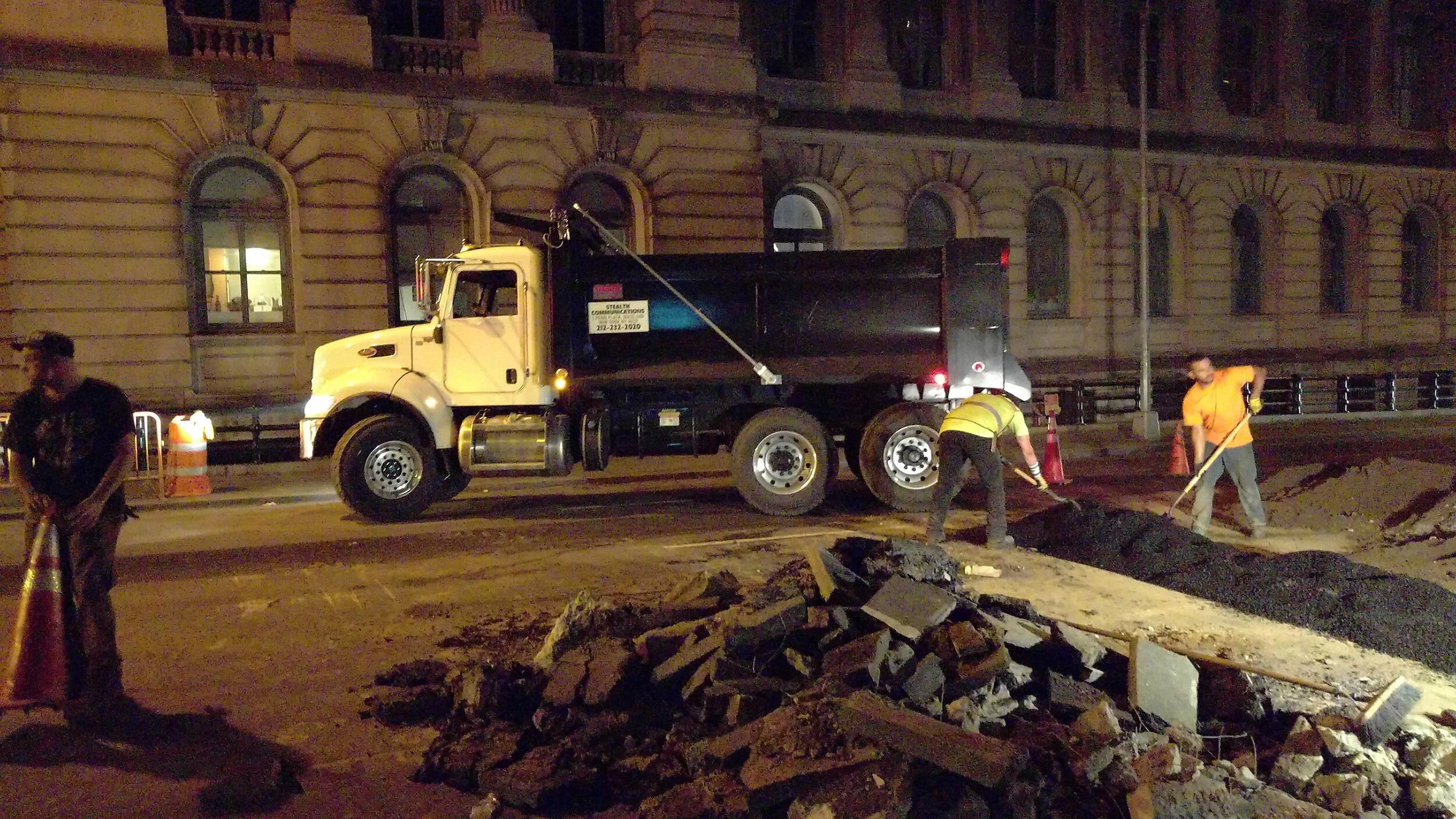Philip K. Howard: A way to make Biden infrastructure program work as hoped
Construction crew laying down asphalt over fiber-optic trench, in New York City
— Photo by Stealth Communications
The Bourne Bridge and the Cape Cod Canal Railroad Bridge at sunset. The Bourne Bridge, at the canal’s western side, and the Sagamore Bridge, to the east, both built in the Thirties, are slated to be replaced.
President Biden’s breathtaking $5 trillion infrastructure agenda — about $50,000 in debt for each American family — is stalling on broad skepticism on both the goals and means of spending that money. There’s bipartisan agreement on at least some of the goals: Spending $1.2 trillion to fix roads, build new transmission lines, expand broadband, and provide clean water could improve American competitiveness as well as its environmental sustainability.
There’s a deal to be made here: Use this moment to overhaul how Washington spends money. Skeptics are correct that, otherwise, most of the money will go up in smoke. What’s needed is a new set of spending principles, based on the principle of commercial reasonableness, enforced by a nonpartisan National Infrastructure Board.
The key to governing is implementation. Big talk in press conferences rarely results in success. Nor does throwing money at a problem. The chaos in Afghanistan reveals what happens when top-down dictates are not accompanied by a practical plan for executing the goal. But the Biden administration has no plan on how to implement its infrastructure proposals wisely.
What is certain is that, without reform, most of the infrastructure money will be wasted. Red tape, delays, rigid contracting rules, entitlements and other inefficiencies guarantee that American taxpayers will receive less than 50 cents of infrastructure value for each dollar. That’s optimistic. Comparative studies of infrastructure costs in developed countries show that public transit in the U.S. can be four times as expensive as in, say, Spain or France. A highway viaduct in Seattle cost three times more than a comparable project in France, and seven times more than one in Spain.
What causes the waste? No U.S. official has authority to use commonsense, at any point in the process, to build infrastructure sensibly. Other countries have “state capacity”— a euphemism for public departments where officials are given the authority to make contract and other decisions comparable to their counterparts in the private sector. In America, by contrast, officials’ responsibility is preempted by red tape.
Here are some of the main drivers of waste:
- Permitting can take years because no official has authority to 1) limit environmental reviews to important impacts; 2) resolve disagreements among competing agencies; or 3) expedite resolution of lawsuits. In our study Two Years, Not Ten Years we found that delay alone can more than double the effective cost of projects.
- Rigid procurement protocols strive to detail each nut and bolt in advance, limiting the flexibility needed to confront unanticipated issues inherent in any complex construction project. This leads to massive waste as well as costly change orders.
- Union collective-bargaining entitlements have accumulated over the decades, for example, requiring twice as many workers as needed to operate the tunneling machine for a New York subway. Work rules are designed not for safety or efficiency, but to provide compensation even where there’s no work.
- Legislative mandates further increase the cost of public projects. The “Buy American” laws can increase costs by 25 percent, sometimes more. The Davis-Bacon Act from 1931 increases labor costs by upwards of 20% over market by requiring “prevailing wages”— which is a euphemism for highest wage that can be justified. An army of Washington bureaucrats has the job of dictating wage rates and benefit packages in hundreds of construction job categories in each of 3,000 designated labor markets in the U.S.
- All these legal processes, rigidities and entitlements provide grounds for a lawsuit for any unhappy bidder, contractor, labor union, or environmental group. Lawsuits not only add costs to delay projects, but are commonly used as a weapon to extract payments and concessions that further raise the costs.
Thick rulebooks have supplanted human responsibility. Washington allocates money, with lots of legal strings. It then gives grants to states and localities, many of which are actuarily insolvent – precisely because they cannot manage their public unions and other interest groups. Time passes. Lawyers and consultants produce environmental impact statements. Various groups object and threaten lawsuits. Unions demand ever-greater benefits. Understaffed civil servants try to write procurement guidelines that anticipate every detail and eventuality. The low bidder wins, even if the bidder has a lousy record. Some infrastructure gets built, often badly, and always at a cost that far exceeds what a commercial builder would have paid. The waste here is a scandal — political leaders might as well take taxpayer money and throw it in the fireplace.
How should infrastructure be built? What causes waste in building infrastructure, as NYU’s Alon Levy puts it, is “rigid[ity], where what is needed is flexibility and empowerment” of officials with responsibility. Someone needs to be in charge of each project, and whoever’s in charge needs to have the flexibility to negotiate contracts, adapt to new conditions, and, above all, not to be hamstrung by unrelated requirements.
Building roads, bridges and power lines isn’t rocket science. Other countries and private companies know how to do this. Most public engineers know what performance standards are required. By the simple mechanism of empowering public servants to take responsibility, Levy found, other countries are able to “spend a fraction of what the US does on the same bridge or tunnel.”
Giving officials flexibility to use their judgment, however, requires a mechanism to overcome Americans’ distrust of government. That’s what keeps America’s byzantine bureaucracy in place. Any effort at reform is resisted by groups who argue “What if... an official is on the take?” “What if…the official is Robert Moses, and wants to bulldoze poor communities?”
Opponents to spending reform are mobilizing as I write. The $1.2 trillion Senate bill includes permitting reforms that seek to limit the permitting process to two years. But even this modest reform is under attack by “environmental justice” groups who argue that two years is insufficient to consider those issues. Similarly, a reform to expedite permits for interstate transmission lines is being vigorously opposed by the state energy regulators. They pluck the strings of distrust. But their real objection is that minimizing delay removes the legal veto which they use to extract lucrative benefits for themselves.
What’s needed to overcome distrust is a nonpartisan oversight body that is empowered to avoid waste and corruption. In other developed countries, most citizens accept official authority. But Americans don’t. Creating a trusted oversight institution means it can’t be in the control of either political party. An example are the nonpartisan “base-closing commissions” which decide which defense bases should be shuttered.
I propose a nonpartisan National Infrastructure Board, analogous to oversight boards in Australia and other countries. Its responsibilities would be not to build infrastructure but to oversee and report on how infrastructure is built. Funding could still go through states, but only on condition that timelines and contracts meet standards of commercial reasonableness. No more featherbedding. No more payoffs. States would lose funding if they continued current practices.
The power of a trusted oversight body is exponentially greater than its size. The availability of accountability, not micromanagement, is the element that avoids waste while instilling trust and confidence that everyone is doing their part.
America is at an institutional crossroads. Nothing much works as it should because no official, or teacher, or hospital administrator, or manager, is authorized to make sensible choices. Pruning the jungle of red tape never works because the underlying premise is to avoid human judgment on the spot. The only solution is to replace the jungle with a simpler framework activated by human responsibility and accountability. But who will oversee those officials? That’s why a trusted oversight body is essential.
Philip K. Howard is a lawyer, author and chairman of Common Good, a bipartisan reform coalition. This piece first ran in The Hill.

